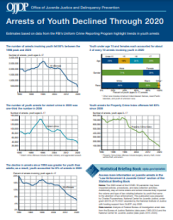Data collections
Breaking the School-to-Prison Pipeline: Implications of Removing Police from Schoolsfor Racial and Ethnic Disparities in the Justice System
ABCD Social Development (ABCD-SD)
How Do “Credible Messenger” Mentors Promote Youth Development? A Retrospective, Longitudinal Study in Atlanta, Birmingham, and Houston
Identifying the Scope and Context of Missing and Murdered Indigenous Persons (MMIP) in New Mexico and Improving MMIP Data Collection, Analysis, and Reporting
Agreement and error rates associated with standardized data collection protocols for skeletal and dental data on 3D virtual subadult crania
Using Open-source Data to Better Understand and Respond to American School Shootings: Introducing and Exploring the American School Shooting Study (TASSS)
"Shadow Costs: The Effect of Economic and Informational Inequality on Court-Order Compliance".
Use and Impact of the Wisconsin Bullying Prevention Program Assessment Tool in Addressing Middle School Bullying
Human Trafficking Project
Arrests of Youth Declined Through 2020
NIJ Multisite Impact and Cost-Efficiency Evaluation of Veterans Treatment Courts
Formative Evaluation of a Hospital-based Violence Intervention Programs and Victim Services in Chicago
Cuyahoga County, Ohio, Heroin and Crime Initiative: Informing the Investigation and Prosecution of Heroin-Related Overdose, Research Abstract
National Juvenile Court Data Archive: Final Technical Report
What Constitutes Success? Evaluating Legal Services for Victims of Crime, A Formative Evaluation, Webinar, 2021
What Constitutes Success? Evaluating Legal Services for Victims of Crime, Final Site Report: Maryland Crime Victims Resource Center
What Constitutes Success? Evaluating Legal Services for Victims of Crime, Final Site Report: Arizona Voice for Crime Victims
Tribal Crime, Justice, and Safety, Part 1
Research indicates that Native American persons experience crime victimization at higher rates than non-Native people. Furthermore, the unique position of American Indian and Alaska Native tribes as both sovereign nations and domestic dependents of the U.S. creates jurisdictional complexities in responding to crime, justice, and safety. Senior social and behavioral scientist Christine (Tina) Crossland discusses NIJ’s research on these topics, especially on the prevention of violence towards American Indians and Alaska Natives. Communications Assistant Stacy Lee Reynolds hosts.
Performing a BLAST search of the STRSeq BioProject
System Dynamics Simulation Model of Cocaine Prevalence
Latent Fingerprint Interoperability - Survey State Addendum
Taking Stock: An Overview of NIJ's Reentry Research Portfolio and Assessing the Impact of the Pandemic on Reentry Research
Over several decades, the National Institute of Justice (NIJ) has made significant contributions to the field of reentry, specifically what works for whom and when. In recent years, however, the global pandemic has made it increasingly difficult to conduct research on and with populations involved with the justice system. During this time, many researchers assessing various justice-related outcomes were unable to continue their inquiries as planned due to a lack of access to their populations of interest, forcing many to pivot and rethink their research designs.
See the YouTube Terms of Service and Google Privacy Policy
Learning from Doing Evaluating the Effectiveness of the Second Chance Act Grant Program
Reauthorized in 2018, the Second Chance Act (SCA) aims to reduce recidivism and improve outcomes for people returning from state and federal prisons, local jails, and juvenile facilities through the provision of federal grants. During this panel, National Institute of Justice-funded researchers will detail two ongoing evaluations of the SCA grant program:
- An evaluation of the effectiveness of the SCA grant program per Title V of the First Step Act.
- A longitudinal examination of the long-term impacts of the SCA program.
See the YouTube Terms of Service and Google Privacy Policy










